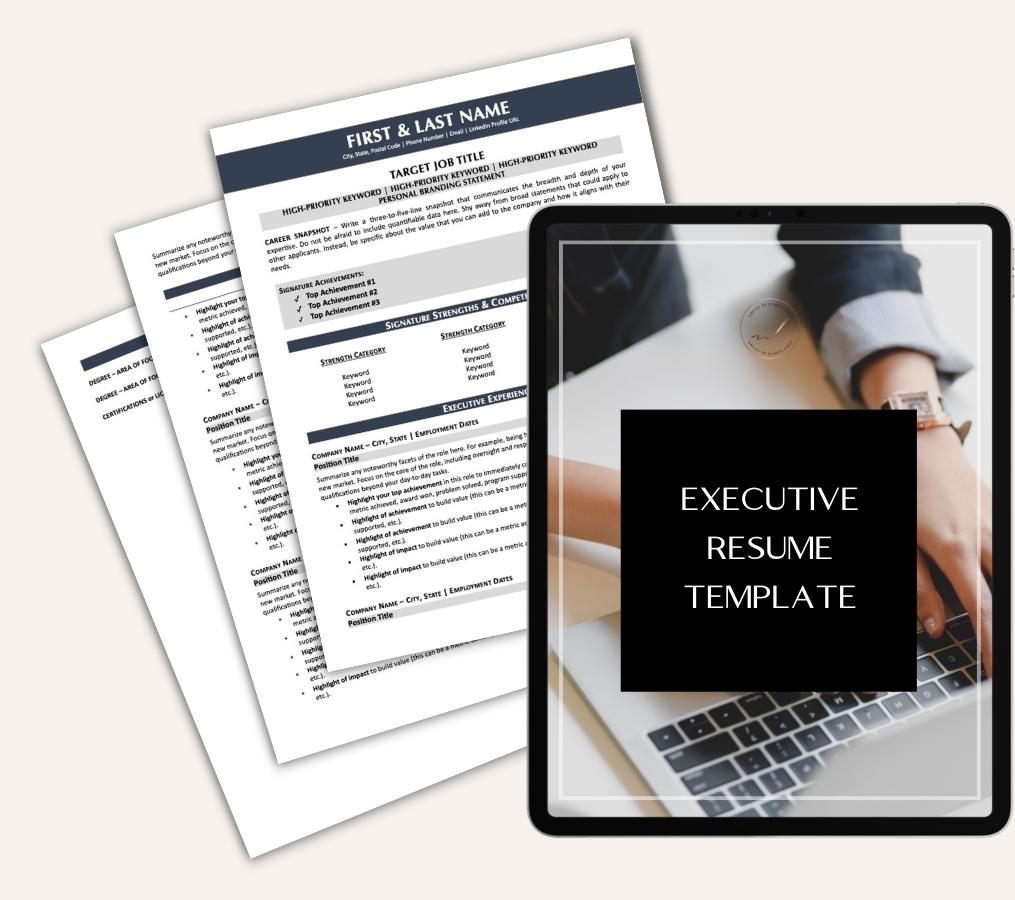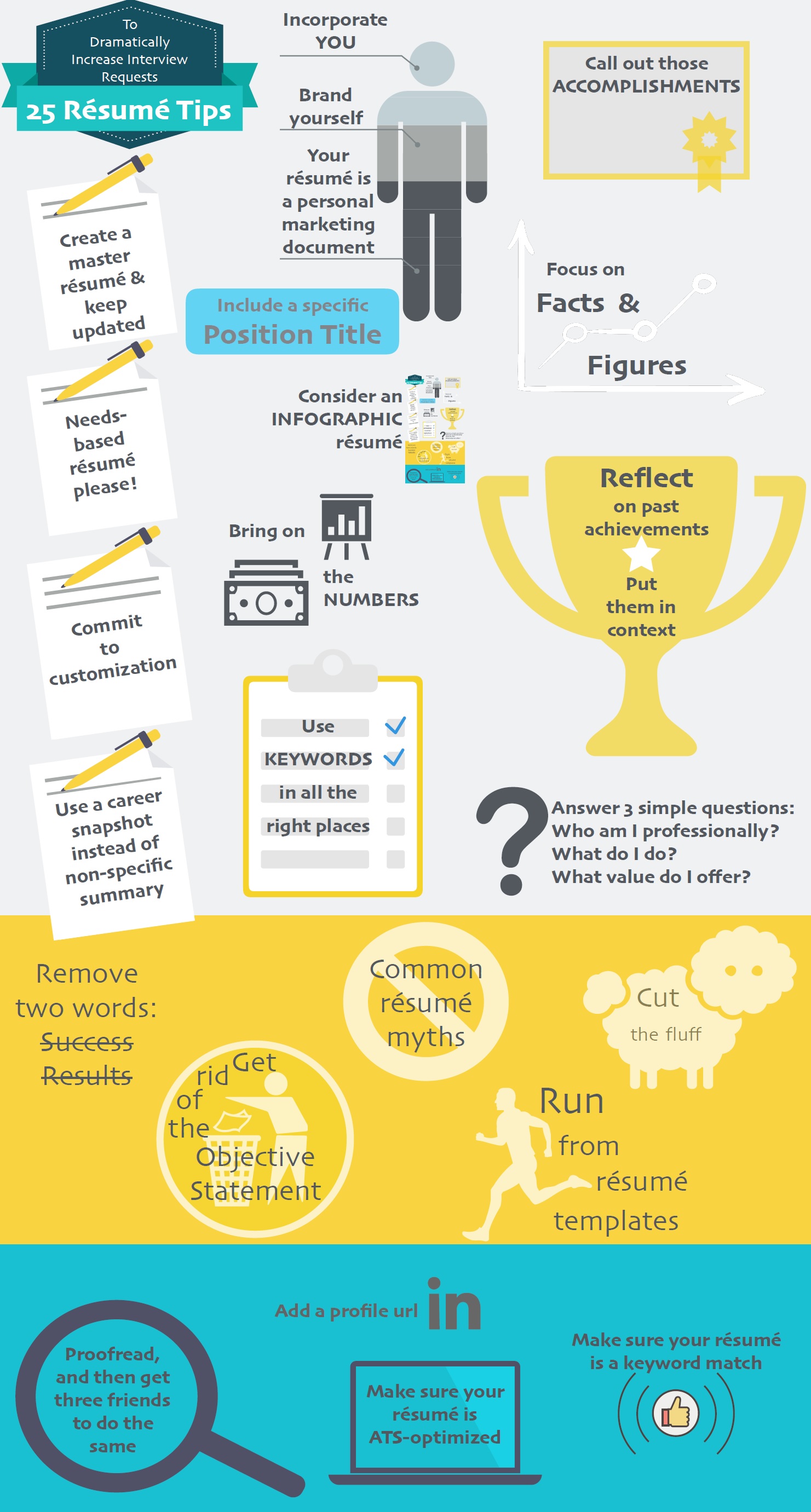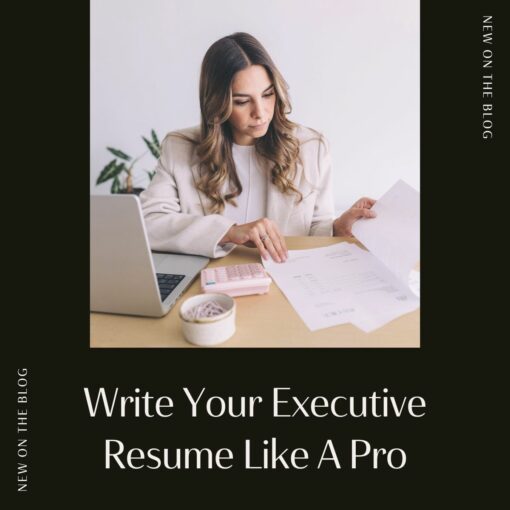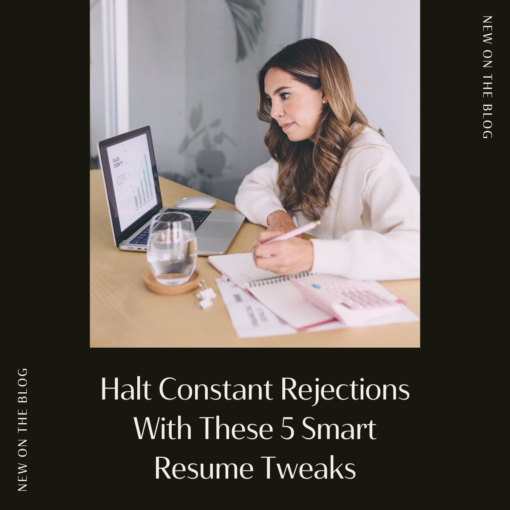INFOGRAPHIC: 25 Resume Tips to Dramatically Increase Interview Requests
You have an impressive work history and a long list of accomplishments, but you can’t seem to get the attention of recruiters or hiring managers. It can be easy to get frustrated with your job search if this is happening to you, and you’re probably wondering what’s going on and what mistakes you might be making. If you’ve been sending out countless resumes but have received few responses, your resume may be the issue. So how can you increase your chances of getting an interview? There are many ways that you can improve your resume and cover letter to help get the attention of potential employers. I’ve created a 25-point resume tips infographic with dos and don’ts to help you evaluate your current resume and make much needed improvements that can dramatically increase your resume responses.
As you can see on the infographic, many of the resume writing tips revolve around customizing your resume—making it specific to you, your brand, your achievements, your qualifications, and the specific position for which you are applying. The employer who will be reading your resume wants to know how you and your skills and strengths are different from other applicants, but most importantly they want to know how your skills and experience are going to be put to use for them and their company specifically. Let’s look a little deeper into some of these writing tips and how they can add value to your resume and help you increase your chances of getting an interview.
Address the Employer’s Needs
On the infographic, you can see I recommend getting rid of your objective statement. This is because while your resume, of course, has to be about you, it should always be directed at the employer. An objective statement talks about why you are putting in an application, why you think this job is a good opportunity for you, and what you hope to get out of the job. An employer really does not care about how you are hoping to advance your career. The question that is running through their mind as they go through applications is “How can this person help me?” When you write a resume, you need to have that question in your head: “How can I help this employer?” So instead of a career objective, consider including a personal brand statement that describes how your particular skills and work experience can be of benefit to a potential employer. Doing so will make an excellent impression and help you stick out in an employer’s mind when it comes time to make calls to schedule an interview with potential candidates.
Within each section of your resume, you should also be tailoring descriptions and information to fit the needs of the position and company you are applying to, or to attract the attention of a recruiter in the particular industry where you want a job. One of the best ways to find out this information is to closely read the job posting, then head to the company’s website and social media pages to find out more information. You’ll learn about company culture and current initiatives, and may be able to glean a few things about their target markets or clients. You can also use your network—ask questions about the company, the hiring manager’s priorities, etc., to gauge what you might want to include or leave off of your resume and cover letter.
When listing things like skills on your resume, make sure you are including primarily relevant skills and relevant achievements—extraneous information can just clutter your resume and distract from what the prospective employer really wants to see. If you have transferable skills, don’t just assume the potential employer knows how they are transferable. Take a few words to connect those skills to the position.
A simple change you can make to your application to customize it is to include a specific title on your resume and in your cover letter. For example, instead of saying that you are looking for a job as a “Healthcare Executive” use the exact job title in the job posting. You should also make sure your cover letter is addressed to a specific person—this way the hiring manager knows that you have actually done a little bit of research into the company, and care enough to directly address it and tailor your resume, rather than just copy and paste the same information to a dozen potential employers.
When you apply to jobs, you should never send the exact same resume to multiple employers. An effective resume is a customized resume. When you focus on the needs of a specific employer, you are far more likely to get a call and be able to move through the hiring process, rather than just wonder what black hole your resume fell through.
Facts & Figures
Including numbers on your resume is one of the most effective ways to catch an employer’s attention and increase your chances of landing an interview. Throughout your career, you no doubt have had accomplishments that you can translate into numbers to better demonstrate your value to an employer. Increased sales for your past employer? Include the percentage increase on your resume. Manager of a team? Include the number of people you managed.
Go back through the accomplishments and achievements that are on your current resume and try to attach a number to each one. Doing so is probably easier than you think, and is a quick way to create a good resume and help your application stand out.
Why do facts and figures matter to an employer? They are quantitative proof of what you have done in a previous role, and show your potential as an employee. Anyone can claim to be a “sales expert,” but if you have the numbers to back it up you will immediately become a more impressive candidate.
Consider Changing the Format
Before I delve into this, let me first ask—are you using a resume template you found on the internet and just plugging your information into it? If so, we’ve found your problem. Templates are okay to use as a basic guide or example, but you should never just fill one in.
Even if you’re not using a template, you might consider playing around with your resume format. Adding graphics to emphasize impressive numbers or achievements can help get attention, as can moving around sections. Does your resume go right into a chronology of past jobs or have your education listed at the top? A better way to get a prospective employer’s attention is to change the formatting to put relevant skills and accomplishments in a box, or as some kind of visual, at the top.
Your resume format might also just be simply too text-heavy. Are you using long paragraphs exclusively, or do you mix up bullet points and paragraphs? No one wants to stare at a two-page block of text, especially not a hiring manager who is looking through potentially hundreds of resumes in a day. Mix things up, think about how you’d like to read this information, and change your format to help get attention and get an interview. You might even consider a full infographic resume as I suggest in my 25 resume tips infographic!
The font can also make a difference. I find Times New Roman to be unattractive and simply overdone. If a potential employer has read through a dozen resumes written using times New Roman, yours will just be a blur and one among many. A different font (but not too different, still professional) is a good idea to help yours stand out.
Use Your Resume as a Personal Marketing Document
Yes, you need to speak to the employer’s needs, but you can still do that while writing a resume that is a personal marketing document. This is more about changing your mentality when you’re writing your resume. Instead of thinking of it as a detailed chronology of your career, think of it as a marketing document—which is what it really is. Consider your target market—your potential employer—and tailor your resume’s information, phrasing, and keywords to grab their attention. Consider your brand—your skills, work experience, culture fit, achievements—and shape them into a message that resonates with your target market. Resume writing is about selling yourself with persuasive writing; that’s part of why it is so hard for so many people—even professional writers. Nobody likes to write about themselves. But when it comes to resume writing, you simply have to do it. Remember, everyone else competing for the job you want is doing the same.
When you prepare a resume using the tips contained in this infographic, you should see an increase in interview requests. And, hopefully, you will soon find yourself hired for a job that advances your career.
If you’d like to discuss how Great Resumes Fast can help you prepare a resume that can help you achieve your career goals, give us a call or email us today. Our team of professional resume writers is committed to getting to know your goals and your professional experience, and creating customized career documents tailored for your needs. Our executive resume writing services have helped hundreds of people achieve their career goals, and we’d love to do the same for you.
For more resume tips, head over to the Great Resumes Fast blog archive.
Are you tired of your resume being rejected by applicant tracking systems? I know how frustrating it is to submit your resume and receive no response. I hate seeing qualified people never break through the screening process. It shouldn’t be that way. That’s why I created this guide and I encourage you to download the FREE PDF so you can start seeing better resume response rates!
Share this post:

About the author
Jessica Hernandez, President, CEO & Founder of Great Resumes Fast
Hi, I’m Jessica. I started this company back in 2008 after more than a decade directing hiring practices at Fortune 500 companies.
What started as a side hustle (before that was even a word!) helping friends of friends with their resumes has now grown into a company that serves hundreds of happy clients a year. But the personal touch? I’ve kept that.
You might have seen me featured as a resume expert in publications like Forbes, Fast Company, and Fortune. And in 2020, I was honored to be named as a LinkedIn Top Voice of the year!
I’m so glad you’re here, and I can’t wait to help you find your next perfect-fit position!
1 Comments
Leave a Comment
Improve Your Resume: Download Your Free Executive Resume Template Today
Are you struggling to create an executive resume that will impress employers? Download this free executive resume template and receive a series of 10 emails with expert guidance on how to write resume content that resonates with employers so you get more interviews.
It's everything you need to stand out, make an impression, and accelerate your job search.










[…] 25 Resume Tips To Dramatically Increase Interview Requests – Jessica Holbrook Hernandez […]